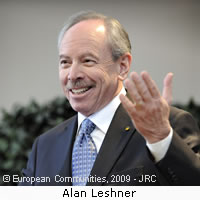AAAS chief calls for greater EU-US research cooperation
The EU and the US must forge stronger research ties in order to tackle the greatest challenges facing the world today, Alan Leshner, CEO of the American Association for the Advancement of Science (AAAS), told attendees at the inaugural annual lecture of the Joint Research Centre (JRC) in Brussels, Belgium on 28 October. Speaking on the topic 'Europe and the United States: a crucial moment for science cooperation', Dr Leshner noted that science and technology (S&T) touch on all aspects of modern life and are components of all the major issues facing the planet, including climate change, health and communications, to name just a few. 'The US and Europe should be collaborating on all these issues!' he said emphatically. In fact, EU-US research cooperation has a long history; and the two parties have had formal S&T agreements in place since 1998. Nevertheless, Dr Leshner acknowledged that in recent years, the US has not always been the ideal research partner; difficulties obtaining visas, restrictions on grants and stringent lab security requirements put in place in the aftermath of 9/11 have led to a drop in the numbers of foreign scientists applying to work in the US. However, Dr Leshner added, 'the official US stance on science is changing.' US President Barack Obama has pledged to increase science spending to 3% of GDP (gross domestic product) and has committed himself to improving the quality of science education. Under America's Recovery and Investment Act, science gets an additional USD 21.5 billion (EUR 14.6 billion) spread over 2 years. Looking at the wider world, Dr Leshner pointed out that countries around the globe are waking up to the fact that if they wish to prosper, they need to invest in research and design policies that reflect the best science. At the same time, international scientific collaborations are becoming increasingly common. Dr Leshner argued that both the EU and US should play a leading role in creating a truly global scientific community. In particular, efforts need to be made to integrate scientists from developing countries in the wider international research community. Together, scientists from all nations need to agree on fundamental issues such as research ethics and intellectual property rights, he added. Another area where EU-US cooperation could bring mutual benefits is in engaging with the public. Dr Leshner praised the European Commission's efforts in this area, and said that the two sides could learn a lot from each other. 'We at the American Association for the Advancement of Science realise that current American and European attitudes and perceptions about science, ranging from issues at the nexus of religion and politics, and competitiveness and immigration, may sometimes seem antithetical to science-based progress,' Dr Leshner commented. 'But we must never waiver in our resolve to tackle such misperceptions while keeping the public on board.' For his part, EU Science and Research Commissioner Janez Potocnik is optimistic about the future of EU-US research cooperation. 'Of course there are some differences in our approach to science and technology,' he said. But, he added, 'the Atlantic is narrower than before.' At the end of the lecture, Dr Leshner and the JRC (represented by its Director-General Roland Schenkel) signed a Memorandum of Understanding between their two organisations. The three-year agreement will see the JRC and the AAAS organise joint workshops, collaborate on the publication of reports and share information on key issues. The first activities under the agreement are likely to focus on nuclear forensics, nuclear and radiological security, and technologies for the monitoring of arms control treaties.
Countries
United States



